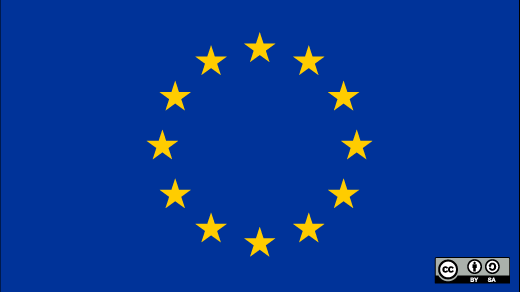On May 25, 2018 the General Data Protection Regulation will go into effect. This new regulation by the European Union will impact how organizations need to protect personal data on a global scale. This could include open source projects, including communities.
GDPR details
The General Data Protection Regulation (GDPR) was approved by the EU Parliament on April 14, 2016, and will be enforced beginning May 25, 2018. The GDPR replaces the Data Protection Directive 95/46/EC that was designed "to harmonize data privacy laws across Europe, to protect and empower all EU citizens data privacy and to reshape the way organizations across the region approach data privacy."
The aim of the GDPR is to protect the personal data of individuals in the EU in an increasingly data-driven world.
To whom does it apply
One of the biggest changes that comes with the GDPR is an increased territorial scope. The GDPR applies to all organizations processing the personal data of data subjects residing in the European Union, irrelevant to its location.
While most of the online articles covering the GDPR mention companies selling goods or services, we can also look at this territorial scope with open source projects in mind. There are a few variations, such as a software company (profit) running a community, and a non-profit organization, i.e. an open source software project and its community. Once these communities are run on a global scale, it is most likely that EU-based persons are taking part in this community.
When such a global community has an online presence, using platforms such as a website, forum, issue tracker etcetera, it is very likely that they are processing personal data of these EU persons, such as their names, e-mail addresses and possibly even more. These activities will trigger a need to comply with the GDPR.
GDPR changes and its impact
The GDPR brings many changes, strengthening data protection and privacy of EU persons, compared to the previous Directive. Some of these changes have a direct impact on a community as described earlier. Let's look at some of these changes.
Consent
Let's assume that the community in question uses a forum for its members, and also has one or more forms on their website for registration purposes. With the GDPR you will no longer be able to use one lengthy and illegible privacy policy and terms of conditions. For each of those specific purposes, registering on the forum, and on one of those forms, you will need to obtain explicit consent. This consent must be “freely given, specific, informed, and unambiguous.”
In case of such a form, you could have a checkbox, which should not be pre-checked, with clear text indicating for which purposes the personal data is used, preferably linking to an ‘addendum’ of your existing privacy policy and terms of use.
Right to access
EU persons get expanded rights by the GDPR. One of them is the right to ask an organization if, where and which personal data is processed. Upon request, they should also be provided with a copy of this data, free of charge, and in an electronic format if this data subject (e.g. EU citizen) asks for it.
Right to be forgotten
Another right EU citizens get through the GDPR is the "right to be forgotten," also known as data erasure. This means that subject to certain limitation, the organization will have to erase his/her data, and possibly even stop any further processing, including by the organization’s third parties.
The above three changes imply that your platform(s) software will need to comply with certain aspects of the GDPR as well. It will need to have specific features such as obtaining and storing consent, extracting data and providing a copy in electronic format to a data subject, and finally the means to erase specific data about a data subject.
Breach notification
Under the GDPR, a data breach occurs whenever personal data is taken or stolen without the authorization of the data subject. Once discovered, you should notify your affected community members within 72 hours unless the personal data breach is unlikely to result in a risk to the rights and freedoms of natural persons. This breach notification is mandatory under the GDPR.
Register
As an organization, you will become responsible for keeping a register which will include detailed descriptions of all procedures, purposes etc for which you process personal data. This register will act as proof of the organization's compliance with the GDPR’s requirement to maintain a record of personal data processing activities, and will be used for audit purposes.
Fines
Organizations that do not comply with the GDPR risk fines up to 4% of annual global turnover or €20 million (whichever is greater). According to the GDPR, "this is the maximum fine that can be imposed for the most serious infringements e.g.not having sufficient customer consent to process data or violating the core of Privacy by Design concepts."
Final words
My article should not be used as legal advice or a definite guide to GDPR compliance. I have covered some of the parts of the regulation that could be of impact to an open source community, raising awareness about the GDPR and its impact. Obviously, the regulation contains much more which you will need to know about and possibly comply with.
As you can probably conclude yourself, you will have to take steps when you are running a global community, to comply with the GDPR. If you already apply robust security standards in your community, such as ISO 27001, NIST or PCI DSS, you should have a head start.
You can find more information about the GDPR at the following sites/resources:
-
GDPR Portal (by the EU)
-
Official Regulation (EU) 2016/679 (GDPR, including translations)
-
What is GDPR? 8 things leaders should know (The Enterprisers Project)
-
How to avoid a GDPR compliance audit: Best practices (The Enterprisers Project)






Comments are closed.